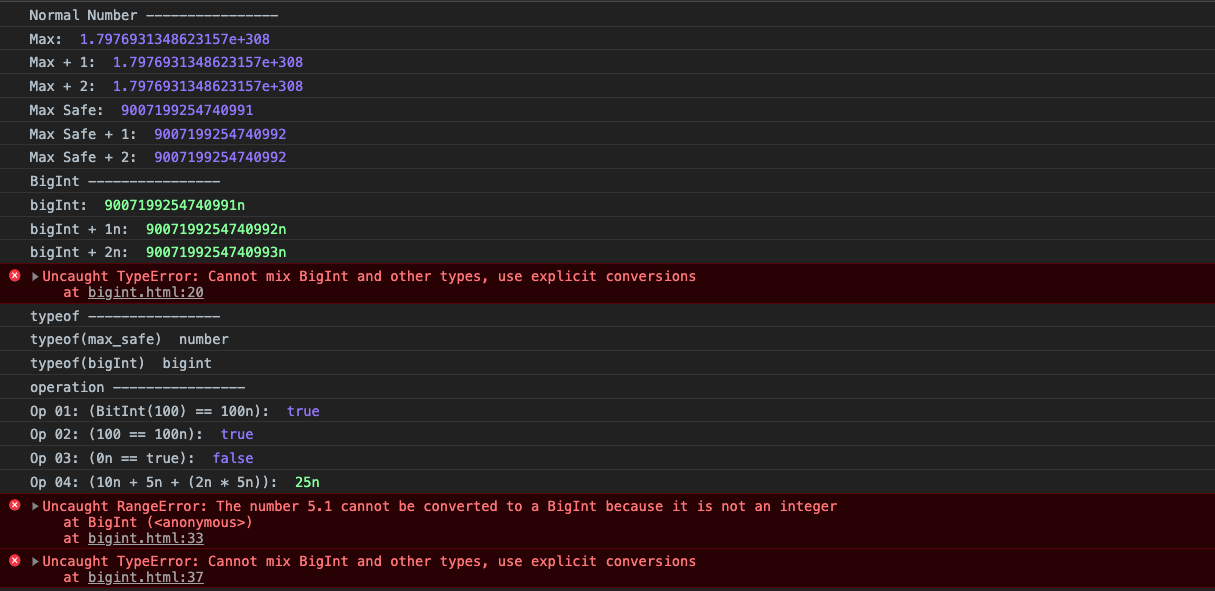ES2020 에서도 몇가지 중요한 기능이 추가 되었습니다.
나날이 자바스크립트의 기능은 더 편리하고 확장되어 가는것을 보니 역시 탑을 유지하는 언어중에 하나라고 생각이 듭니다.
이번에는 ES2020에서 새로 추가된 기능들을 살펴보도록 하겠습니다 .
동적 임포트는 기존의 정적 임포트 방식에서 좀더 함수 스타일의 프로그래밍을 수행할 수 있도록 도와줍니다.
필요없는 모듈을 로드하지 않아도 되는 이점도 함께 제공합니다.
<script>
const greeting_module = "./greeting.js";
// Promise 를 이용한 방식
import(greeting_module)
.then(module => {
module.default();
module.greeting("kido");
})
.catch(error => {
console.log(error);
});
// async/await 를 이용한 방식
(async function () {
const greeting_module2 = "./greeting.js";
const module = await import(greeting_module2);
module.default();
module.greeting("kido");
})();
</script>
위 내용을 보면 ES2020 은 import 를 함수처럼 이용할 수 있으며, 이용할때 Promise 를 사용한다는 것을 확인할 수 있습니다.
참고로 다음과 같이 사용할 수 없습니다.
const greeting = import(...)
이렇게 이용하려면 await 를 이용해야합니다.
정말 멋진것은 다음과 같이 동적으로 필요한 모듈을 프로그램처럼 로드할 수 있습니다.
<script>
async function loadModules(firstValue, fileName) {
const module = await import(`./${firstValue}_${fileName}.js`);
module.loading();
}
const firstValue = 'prefix';
const fileName = 'filename';
loadModules(firstValue, fileName);
</script>
BigInt 는 arbitrary-precision 정수형을 제공합니다.
이는 기존 Number.MAX_SAFE_INTEGER; 의 이상동작이 전혀 없이 연산을 할 수 있습니다.
<script>
console.log("Normal Number ----------------")
var max = Number.MAX_VALUE;
console.log("Max: ", max)
console.log("Max + 1: ", max + 1)
console.log("Max + 2: ", max + 2)
var max_safe = Number.MAX_SAFE_INTEGER;
console.log("Max Safe: ", max_safe)
console.log("Max Safe + 1: ", max_safe + 1)
console.log("Max Safe + 2: ", max_safe + 2)
</script>
<script>
console.log("BigInt ----------------")
var bigInt = BigInt(Number.MAX_SAFE_INTEGER);
console.log("bigInt: ", bigInt)
console.log("bigInt + 1n: ", bigInt + 1n)
console.log("bigInt + 2n: ", bigInt + 2n)
console.log("bigInt + 2: ", bigInt + 2)
</script>
<script>
console.log("typeof ----------------")
console.log("typeof(max_safe) ", typeof (max_safe))
console.log("typeof(bigInt) ", typeof (bigInt))
console.log("operation ----------------")
console.log("Op 01: (BitInt(100) == 100n): ", (BigInt(100) == 100n))
console.log("Op 02: (100 == 100n): ", (100 == 100n))
console.log("Op 03: (0n == true): ", (0n == true))
console.log("Op 04: (10n + 5n + (2n * 5n)): ", (10n + 5n + (2n * 5n)))
console.log("Op 05: BigInt(5.1): ", BigInt(5.1))
</script>
<script>
console.log("Op 06: BigInt(Number.MAX_SAFE_INTEGER) + 1.5: ", BigInt(Number.MAX_SAFE_INTEGER) + 1.5)
</script>
BigInt 는 일반적인 Number 타입이 아니기 때문에 함게 연산할 수 없습니다.
Promise.all 은 여러개의 promise 가 수행되며, response 혹은 reject 결과 한가지만 노출하는 반면, Promise.allSettled 는 각각 처리 결과에 대한 리스트를 반환합니다.
<script>
const pr1 = new Promise(resolve => resolve('first promise'));
const pr2 = new Promise((_, reject) => reject('reject your request'))
const pr3 = new Promise(resolve => resolve("Success "))
console.log("------------ promise all -------------")
Promise.all([pr1, pr2, pr3])
.then(response => console.log(response))
.catch(error => console.log(error));
</script>
<script>
console.log("------------ promise allSettled ----------")
Promise.allSettled([pr1, pr2, pr3])
.then(response => console.log(response));
</script>
자바스크립트에서 global 값에 접근하기 위해서 각 실행 환경에 따라 다양한 객체에 접근해야 했습니다.
이제는 globalThis 를 이용하여 글로벌 값에 접근할 수 있습니다.
node 에서는
globalThis === global 입니다 .
browser 에서는
globalThis === window 입니다.
이를 실험한 코드는 다음과 같습니다 .
// A naive attempt at getting the global `this`. Don’t use this!
const getGlobalThis = () => {
if (typeof globalThis !== 'undefined') return globalThis;
if (typeof self !== 'undefined') return self;
if (typeof window !== 'undefined') return window;
if (typeof global !== 'undefined') return global;
// Note: this might still return the wrong result!
if (typeof this !== 'undefined') return this;
throw new Error('Unable to locate global `this`');
};
const theGlobalThis = getGlobalThis();
from: https://v8.dev/features/globalthis
regular expression 는 효과적인 개발을 위해서 꼭 필요한 도구가 아닐 수 없습니다.
그러나 사용하면서 가끔식은 배열요소들중 매치되는 사항들을 한번에 추출하고 싶은데 장황한 코드가 필요 했었습니다.
이럴때 matchAll 을 이용하여 배열 중 매치되는 요소들만 가져올 수 있습니다.
<script>
console.log("------ 정규식 표현으로 전체가 대문자인 문자만 추출합니다.")
const string = 'Magic hex numbers: DEADBEEF CAFE';
// \b 는 단어의 경계(시작/끝)를 확인합니다.
// \p POXIX 문자 클래스를 이용한다. 이는 US-ASCII 에서만 사용가능
// {ASCII_Hex_Digit} 는 아스키, 16진수, 숫자등을 검출한다. [0-9a-fA-F] 내용을 찾을 것입니다.
// + 는 1번이상 반복됨을 나타냅니다.
// \b 다음 공백을 찾는다.
// g 는 글로벌의 의미로 대상 문자 모두에 대해 적용합니다.
// u 는 유니코드를 지원합니다.
const regex = /\b\p{ASCII_Hex_Digit}+\b/gu;
for (const match of string.match(regex)) {
console.log(match);
}
</script>
<script>
console.log("------ 매치되는 데이터, 인덱스, 입력된 문자도 노출한다. ")
const regex2 = /\b\p{ASCII_Hex_Digit}+\b/gu;
let match;
while (match = regex2.exec(string)) {
console.log(match);
}
</script>
<script>
console.log("------ 매치되는 데이터, 인덱스, 입력된 문자도 노출한다. 단 matchAll 을 이용한다. ")
const regex3 = /\b\p{ASCII_Hex_Digit}+\b/gu;
for (const match of string.matchAll(regex3)) {
console.log(match);
}
</script>
<script>
console.log("------ 매치되는 데이터, 인덱스, 입력된 문자도 노출한다. 단 matchAll 을 이용한다. 그리고 캡쳐를 이용한다.")
// 단어를 구분하고 \b 이용
// (?<owner>...) ... 에 매치되는 결과를 owner 이라는 이름으로 캡쳐한다.
const regex4 = /\b(?<owner>[a-z0-9]+)\/(?<repo>[a-z0-9\.]+)\b/g;
for (const match of string.matchAll(regex4)) {
console.log(`${match[0]} at ${match.index} with '${match.input}'`);
console.log(`→ owner: ${match.groups.owner}`); // 캡쳐된 단어를 이용한다.
console.log(`→ repo: ${match.groups.repo}`); // 캡쳐된 단어를 이용한다.
}
</script>
from : https://v8.dev/features/string-matchall
에서 소스를 가져 왔으며, 해당 내역마다 주석을 첨부 하였습니다.
결과를 한번 보겠습니다.
지금까지 ES2020 에서 새로 추가된 사항들중에 의미있게 변경된 몇가지를 살펴 보았습니다.
Javascript 를 사용하면서 불편했던 사항들이 개선되면서, 간단한 코드로 훌륭한 작업을 해 낼 수 있는것 같습니다 .


